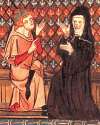 (source)
(source)
|
Peter Abelard
(1079 - 21 Apr 1142)
French scholar whose controversial writings included Sic et Non (Yes or No), which explained theories of logic. He is best known for a tragic love affair with Heloise.
|
Science Quotes by Peter Abelard (2 quotes)
Haec quippe prima sapientiae clavis definitur, assidua scilicet seu frequens interrogatio … Dubitando enim ad inquisitionem venimus; inquirendo veritatem percipimus.
For this is the first key to wisdom, assiduous and frequent questioning. ... By doubting we come to inquiry; by inquiry we perceive the truth.
For this is the first key to wisdom, assiduous and frequent questioning. ... By doubting we come to inquiry; by inquiry we perceive the truth.
— Peter Abelard
Sic et Non (c. 1120). Latin text in Peter Abelard, E.L.T. Henke and G.S. Lindenkohl (eds.), Sic et Non (1851), 16-17. Title translates as Yes or No. As translated in Frederick Denison Maurice, Mediaeval Philosophy; Or, A Treatise of Moral and Metaphysical Philosophy (1870), 138.
Nothing can be believed unless it is first understood; and that for any one to preach to others that which either he has not understood nor they have understood is absurd.
— Peter Abelard
From Historia Calamitatum, Chap. 9. As translated in Arthur Penrhyn Stanley, 'The Word Amen' reprinted from The Independent in Friends' Intelligencer (1872), Vol. 28, 575.
Quotes by others about Peter Abelard (1)
In modern Europe, the Middle Ages were called the Dark Ages. Who dares to call them so now? … Their Dante and Alfred and Wickliffe and Abelard and Bacon; their Magna Charta, decimal numbers, mariner’s compass, gunpowder, glass, paper, and clocks; chemistry, algebra, astronomy; their Gothic architecture, their painting,—are the delight and tuition of ours. Six hundred years ago Roger Bacon explained the precession of the equinoxes, and the necessity of reform in the calendar; looking over how many horizons as far as into Liverpool and New York, he announced that machines can be constructed to drive ships more rapidly than a whole galley of rowers could do, nor would they need anything but a pilot to steer; carriages, to move with incredible speed, without aid of animals; and machines to fly into the air like birds.
In 'Progress of Culture', an address read to the Phi Beta Kappa Society at Cambridge, 18 July 1867. Collected in Works of Ralph Waldo Emerson (1883), 475.
See also:
- 21 Apr - short biography, births, deaths and events on date of Abelard's death.
 In science it often happens that scientists say, 'You know that's a really good argument; my position is mistaken,' and then they would actually change their minds and you never hear that old view from them again. They really do it. It doesn't happen as often as it should, because scientists are human and change is sometimes painful. But it happens every day. I cannot recall the last time something like that happened in politics or religion.
(1987) --
In science it often happens that scientists say, 'You know that's a really good argument; my position is mistaken,' and then they would actually change their minds and you never hear that old view from them again. They really do it. It doesn't happen as often as it should, because scientists are human and change is sometimes painful. But it happens every day. I cannot recall the last time something like that happened in politics or religion.
(1987) -- 


